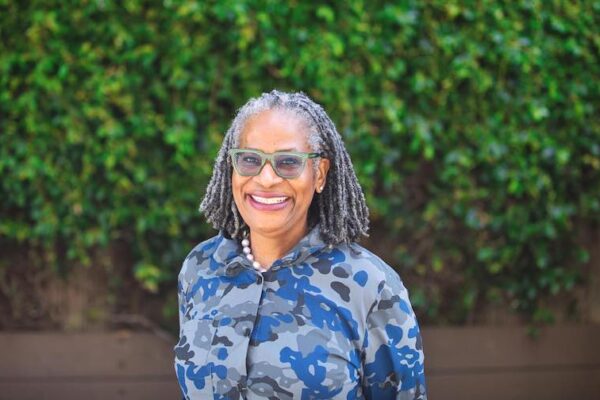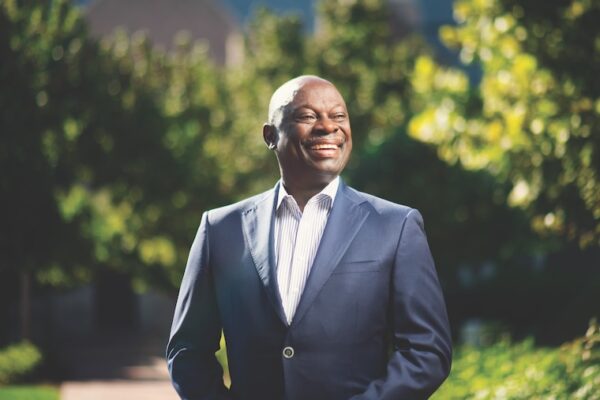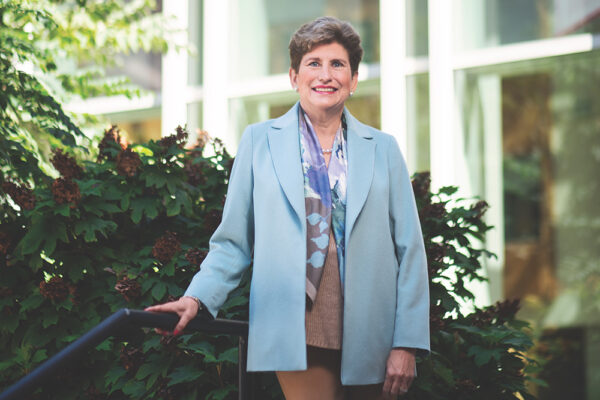Valerie Davisson, MA ’89, worked in recruiting for a small company in St. Louis when businesses nationwide were transitioning away from traditional personnel departments to embrace more people-centric approaches to human resources. She knew she needed more than a bachelor’s degree to advance her career in this new environment but couldn’t afford to quit her job to attend graduate school full time.
Then she saw an ad for the master’s degree program in human resources management offered through Washington University’s School of Continuing & Professional Studies (CAPS), then known as University College. It felt like a door had opened. The ability to work during the day and earn her degree at night was the best of all possible worlds.
With her master’s degree in hand, Davisson landed chief human resources officer positions at multiple corporations. She served at Brinker International, which has a portfolio of more than 1,600 Chili’s Grill & Bar and Maggiano’s Little Italy restaurants, and at Yum! Brands, a Fortune 500 company that franchises and operates more than 55,000 Taco Bell, KFC, Pizza Hut and other restaurants.
“If you think you have all you need from WashU after just four years, you leave a lot on the table. The university has even more to offer once you leave campus.”
Valerie Davisson
In 2013, she joined Garden Ridge amid a major company reorganization. Davisson helped create a new corporate culture for the home décor retailer, which rebranded as At Home in 2015. By the time she retired in 2018, At Home had achieved significant growth, including transitioning to a publicly traded company, and was named to several “Best Places to Work” lists. She now lives in Palm Beach Gardens, Florida, and shares her expertise as an operating adviser with private investment firm Orangewood Partners and its affiliates.
In July, Davisson will become chair of WashU’s Alumni Board of Governors. She currently serves as executive vice chair of the advisory group, which helps the university’s alumni association strengthen bonds between graduates and their alma mater. She also provides strategic oversight to WashU as an ex-officio member of the Board of Trustees.
Describe your WashU experience.
My time as a graduate student was vastly different from my undergraduate education. Before enrolling, I met with administrator Ilene G. Wittels (AB ’53, PhD ’71). Her invaluable guidance and support helped confirm I was on the correct path. No one attends night school because it’s fun; you do it because you have other responsibilities during the day. I was living on my own and had bills to pay. So I had a strong sense of purpose when I arrived on campus, as did my classmates, which elevated the learning experience. We generously shared our stories and had conversations about real-world problems needing solutions. I enjoyed it so much that I was sad when it was time to graduate.
Why do you volunteer for WashU?
I have always supported WashU with my dollars, including endowing a scholarship for CAPS students, but I knew I could also make a meaningful difference by giving my time. Over the years, I have served as a guest speaker, participated in panel discussions and even appeared in a radio commercial. My goal has been to help other learners achieve their dreams of earning a WashU degree while balancing work and family life. I was humbled to receive a Distinguished Alumni Award in 2018 and then be asked to join the Alumni Board of Governors. I am excited to play a more significant role when I move into the chair position this summer.
What are your goals as chair?
I want to educate current students — or what we call future alumni — on what it looks like to be a member of the alumni community. I don’t think people understand the gravitas of the word “alumni.” While the word means that you earned your degree at WashU, it also describes your lifelong relationship with the university. And if you think you have all you need from WashU after just four years, you leave a lot on the table. The university has even more to offer once you leave campus.
I also want to reframe what philanthropy means for alumni, especially those hesitant to donate to WashU after paying tuition. I want them to understand how much they have been given through their education. And to whom much is given, much is expected. They are part of a larger mission, and their support is crucial to the university’s success.
Are there other ways for alumni to support the university?
It’s so important for us to help students in the career space. The No. 1 thing our students want when they graduate is a job. And our alumni have extensive personal and professional networks. It would be incredible if every alum helped one student or new graduate secure an informational interview. We can use our networks to assist young people as they explore different industries and career paths — and maybe even land job offers. It’s our responsibility to create opportunities for connection.


